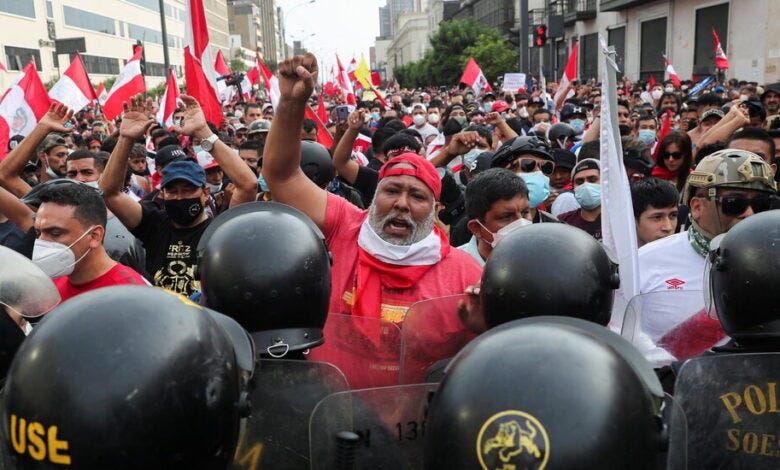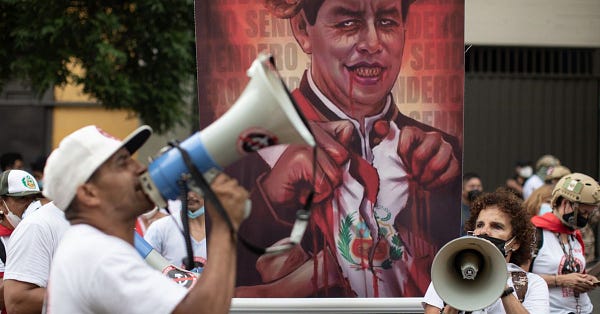The "Nine Meals" Rule
If you’re worried about “democracy dying in darkness,” quit being scared of people who voted for the other guy. Worry about the inability of people to meet their basic needs.

There are only nine meals between mankind and anarchy.
- Alfred Henry Lewis
Ominous, but unsurprising, news for the economy this morning:


Make no mistake: inflation is here to stay. Anyone who still thinks is going to work itself out sometime soon is plainly delusional at this point. It’s still too early to call it “chronic” (this constitutes at least several years of inflation) and we’re still a good ways off from the worst-case scenario of hyperinflation. However, the economic environment the United States finds itself in today isn’t the same one it found itself in 40 years ago. For one, it didn’t have to contend with a Chinese economic powerhouse and it didn’t have to face the prospect of a new global financial order emerging which could undermine the strength of the U.S. Dollar, the very thing underpinning American superpowerdom.
There are simply far too many stressors in play, not to mention the U.S. is facing a tremendous amounts of debt, which narrows the range of options with which policymakers have to stem the tide of inflation. In the late ‘70s into the early ‘80s, raising interest rates, an idea being floated as we speak, was possible because there was so little debt back then relative to now. However, both private and public debt today is enormous, meaning that raising interest rates won’t fix the problem, since not paying off debt isn’t an option (the objective of raising interest rates is to reduce borrowing, thereby blunting spending).
Raise the interest rates too much, you not only throw the economy into a recession, but you raise the cost of paying off that debt. Don’t raise interest rates, inflation continues to rise, unabated. The government doesn’t have direct control over costs in general, but the more it tries to control costs, the more it seems to raise them. Yet, the economy’s functionality and health has become so inextricably tied to state intervention, that it’s impossible for the government not to try to fix the problem, especially since they’ll get blamed for the outcome, either way.
I’ve heard people in both public and personal life boil the inflation debate down to merely a question of comfort and lifestyle. Setting aside the fact such people in both groups are, for now, in a position to weather inflation comfortably, this isn’t merely a matter of not being able to take vacations or have a steak once a week. This is about meeting life’s basic necessities. My trips to the grocery store often result in a bill close to $50, despite purchasing 10 items or less. I’m often told, “Just buy less, eat less.” I’m not sure how many fewer items I can purchase before not buying groceries at all becomes the better option. I can’t imagine what the situation is like for those who make less money than I do, but have entire families to support.
The fact is, inflation hurts most people. The people who are weathering the inflation storm are the minority in this country and their lack of concern on the matter borders on the callous and cruel. If they think this is simply a matter of Americans not checking their privilege, consider what high, sustained inflation tends to do to a society:

Got that? If you’re worried about “democracy dying in darkness,” quit being scared of people who voted for the other guy. Worry about the inability of people to meet their basic needs. I quoted, at the outset, Alfred Henry Lewis, who said, in 1906, “There are only nine meals between mankind and anarchy.” The only reason our society is currently holding together is because most of us are still able to eat and drink when we need to. When we can’t, things will change dramatically. A variation of the Lewis quote was recently offered by financial commentator Bill Holter, who explained:
At this point, every day you wake up you are only 72 hours away from anarchy. The reason being is 72 hours is three days. A person can go three days without food and then pretty much lose it. If you have a system that goes down and store shelves are empty or stores are closed or whatever, you are going to see anarchy.
This is humbling, sobering, stuff. Even a country as big and powerful as the U.S. isn’t immune to any of this. Making matters worse is that, individually and as a society, most of us aren’t mentally prepared for a crisis of this magnitude and, even if we were, it’d still hit us hard. The abundance and convenience we took for granted depended on the system working like clockwork for years and a just-in-time economy relying on non-stop operation, persistent resource availability, and no interruptions or failures of any sort. It takes a lot of capital and labor to make this happen, but the system has received a massive jolt in the last few years, mostly due to anti-COVID measures.
Don’t even try to misunderstand - I’m not suggesting the U.S. is on the verge of starvation. There isn’t any reason to think we are. But, it’s a long road down to Hell. If you’re going to wait until starvation becomes the crisis of the moment before you realize you need to start paying attention, you’re the one who’s been taking it all for granted.
As I write this, Peru is in a state of mass civil disorder. Why? Because of inflation:


So far, eight have died, with many times more assuredly arrested or injured. Peru is in a vastly different place and time from the U.S., yes. My point is to demonstrate what happens when people can no longer afford life’s necessities and that inflation isn’t about being unable to have nice things. Peru’s president, Pedro Castillo, a leftist who had strong public support early on, has been in office only a year and the people already want him out:


There’s a lesson for President Joe Biden there, if his own approval ratings aren’t enough of a wake-up call.
All over the world, populations are becoming restless over rising costs and declining living standards. Sri Lanka, which has defaulted on its foreign debt, appears to have reached the end of a road:



Even in law-abiding, totalitarian China, people have revolted over oppressive anti-COVID measures and a denial of access to food, resorting to looting:

If this isn’t enough evidence to show what happens when people can’t afford food or have no access to it, I don’t know what would suffice. It can happen anywhere and, virtually, without warning. With the possible exception of Sri Lanka, none of the countries mentioned above are at starvation levels, yet they’re still wracked by civil unrest.
The hour is late, but start preparing what little ways you can. A little preparation is always better than none. Food prices may be high, but they can get higher, so focus on stocking up in small amounts over a long period of time. If you have to cut back spending on conveniences, entertainment, luxuries, etc., now’s the time to do so. Don’t wait for the media or the White House to tell you to start preparing for something - by then, it’ll probably be too late.
The likelihood of the U.S. ending up like Peru is still low, but the risk is no longer “zero.” And that ought to deeply concern us all. The timeline just keeps accelerating.
Max Remington writes about armed conflict and prepping. Follow him on Twitter at @AgentMax90.
If you liked this post from We're Not At the End, But You Can See It From Here, why not share? If you’re a first-time visitor, please consider subscribing!


